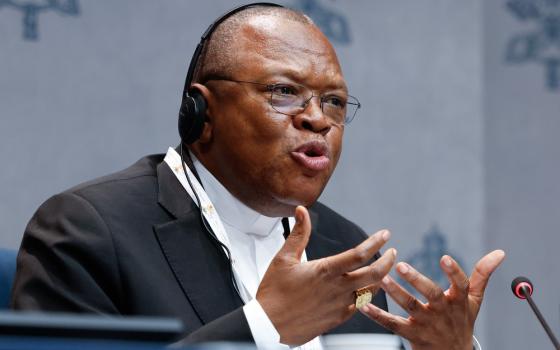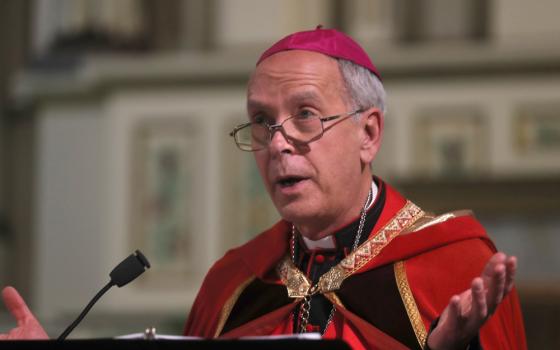Last night, at the CCHD reception, Bishop Kevin Farrell of Dallas praised the work of CCHD and urged his brother bisops to participate fully in the national collection.
"Especially in these difficult economic times, it can be tempting to “make room” for local needs by combining or removing national collections from our calendars," Farrell said. "When we do so, however, we lose opportunities for solidarity and communion which are so vital to our connection to the universal Church."
Farrell called for 100 percent diocesan participation in the CCHD collection. Farrell has been in charge of the Bishops' Committee on National Collections.
I hope CCHD's critics will read Farrell's words again and again. Farrell is no patsy when it comes to the pro-life issue. If he thought the Church's integrity was being compromised in the awarding of CCHD grants, he would not hesitate to say so. Instead, what he points out here is that concern and care for the poor are integral aspects not only of the Church's mission ad extra, but constituitive of her own inner experience of solidarity and communion.
Here is the full text of Bishop Farrell's remarks:
I am also proud to be here in support of the vital work of the Catholic Campaign for Human Development. The work of CCHD is essential to the alleviation of poverty in our country. It is the largest funder of anti-poverty groups that are led by people living in poverty. It is such an extraordinary act, when you think about it, to say to members of a low-income neighborhood “we’ll help YOU make changes in your community.” Those seeds of empowerment bear fruit now and into the future, much as we can see the work of Ms. Carriero continuing on. And the Church, our Church, is there planting those seeds.
The impact that CCHD funding has on poverty in this country is possible because of the leadership of bishops and pastors and the generosity of parishioners across this country. Every year, we have the opportunity to make an impact on poverty in our nation through the parish collection for the Catholic Campaign for Human Development. And, through the other national collections, we impact the Church universal and meet humanitarian needs around the globe. All of the collections are essential to the work of the Church, as they reflect the broad pastoral and social dimensions of our faith. They are annual opportunities for our parishioners to join in our work.
As a body we decided that, as the Church in the United States, we should be involved in pastoral and humanitarian efforts impacting our brothers and sisters in Latin America, in Central and Eastern Europe, in Africa, and here at home in our mission dioceses, as well as to alleviate poverty following Catholic social teaching as we do with CCHD. We made commitments to these ministries and I call on you, my brother bishops, to stay true to them. Especially in these difficult economic times, it can be tempting to “make room” for local needs by combining or removing national collections from our calendars. When we do so, however, we lose opportunities for solidarity and communion which are so vital to our connection to the universal Church. We also weaken our impact on society. We must remain committed to these actions of solidarity even in light of our own diocesan challenges. We cannot let our own local needs take precedence over the needs of the universal Church and our commitments as a national conference.
Let us have faith. Catholics in America, our parishioners, are good and generous people. Even in difficult economic times they are supportive of our work both financially and with prayer. Trust them to make decisions about their generosity. Give them the opportunity to support each national collection, to hear about and pray for the needs of the Church throughout the world, to join with us in the important work that we do. Give them the opportunity to be inspired by the breadth and depth of our outreach through the collections. We will increase our ability to meet the needs that present themselves to us and we may very well inspire other “Janine Carreiros” in the process.
I envision the impact of 100% diocesan participation in every collection our Conference sponsors. I can see the assistance we could offer our brothers and sisters in Latin America, the Caribbean, Central and Eastern Europe, Africa, and the former Soviet Union. I can see our expanded outreach to the poor, to struggling mission dioceses, and to migrants, refugees, and victims of human trafficking. And I can see clearly the connections our parishioners could have to the universal Church’s work of building faith and lifting up the least among us.
It is with deep love for the work that we do and concern for its future that I ask you to affirm our outreach to others through a recommitment to CCHD and all the national collections. I am committed in my diocese to taking up each of the USCCB collections and I challenge you to do the same. Let us lead and have faith.
The Committee on National Collections and the Catholic Campaign for Human Development now wishes to recognize the dioceses which increased their CCHD collections by fifteen percent or more in 2009.
When I read the names, we ask those bishops who are able to join us to come to the front of the room to receive a special award. Please save your applause until after all the names have been read:
Most Rev. Daniel Fernández Torres Diocese of Arecibo
Most Rev. Nicholas DiMarziotDiocese of Brooklyn
Most Rev. Michael Hoeppner Diocese of Crookston
Most Rev. Allen H. VignerontArchdiocese of Detroit
Most Rev. Armando X. OchoatDiocese of El Paso
Most Rev. John T. SteinbocktDiocese of Fresno
His Eminence Daniel DiNardotArchdiocese of Galveston-Houston
Most Rev. David L. RickentDiocese of Green Bay
Most Rev. Timothy L. DohertytDiocese of Lafayette in Indiana
Most Rev. James A. TamayotDiocese of Laredo
Most Rev. Placido Rodr'gueztDiocese of Lubbock
Most Rev. Thomas G. WenskitArchdiocese of Miami
Most Rev. John J. Myerst Archdiocese of Newark
Most Rev. Michael R. CotetDiocese of Norwich
Most Rev. George J. LucastArchdiocese of Omaha
Most Rev. Richard J. MalonetDiocese of Portland in Maine
Most Rev. Matthew Clarkt Diocese of Rochester
Most Rev. Blase J. CupichtDiocese of Spokane
Most Rev. Robert CunninghamtDiocese of Syracuse
Most Rev. Leonard P. BlairtDiocese of Toledo
Most Rev. Carlos A. SevillatDiocese of Yakima
On behalf of the Committee on National Collections and the Catholic Campaign for Human Development, thank you sincerely for your efforts. Let us now give a heartfelt round of applause to all of these dioceses.
Congratulations, again, to Ms. Carreiro.


